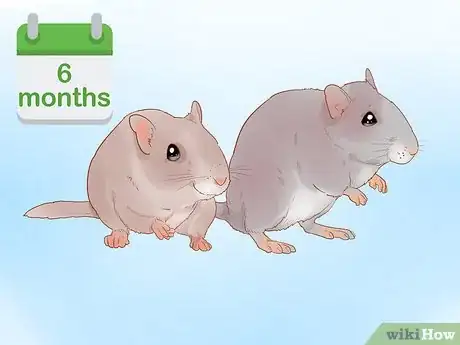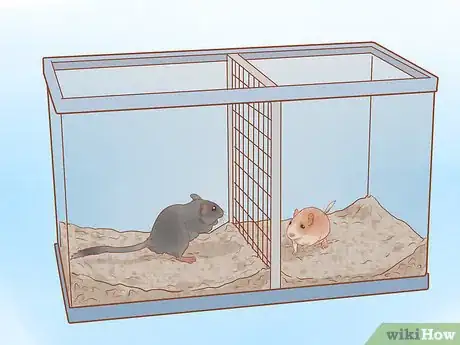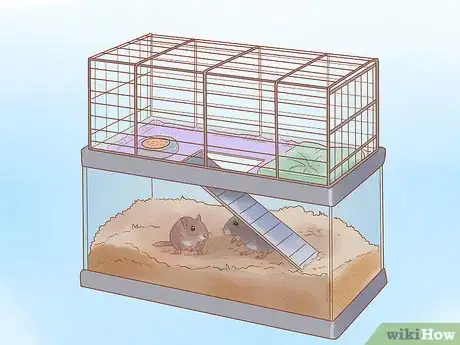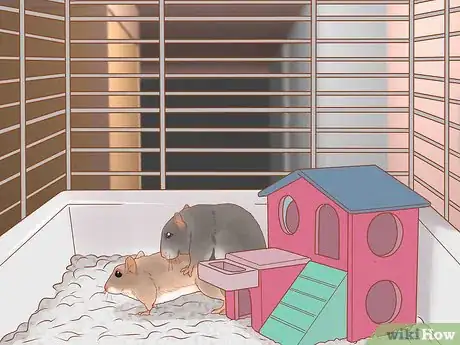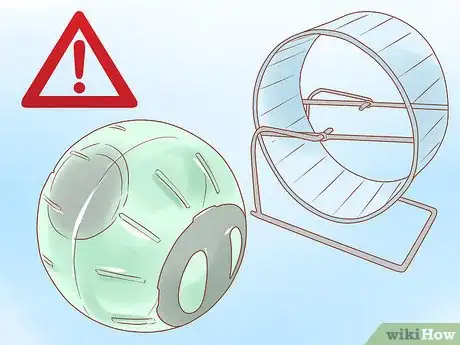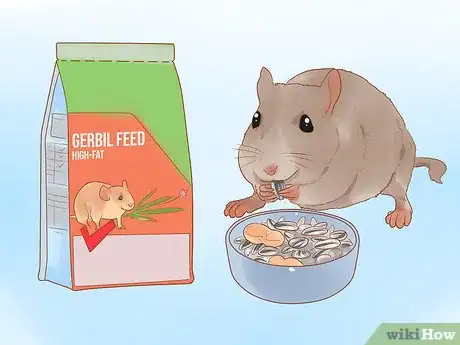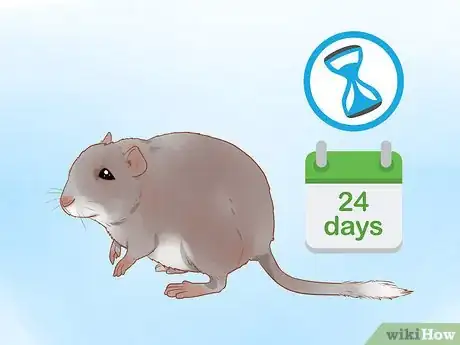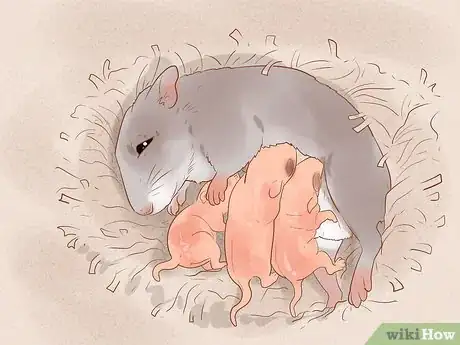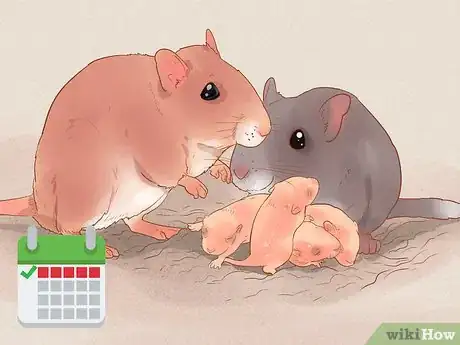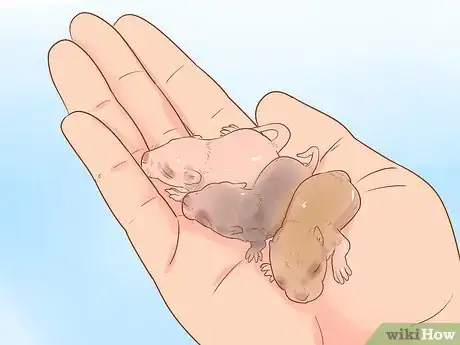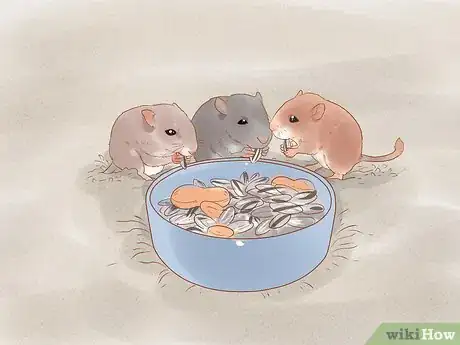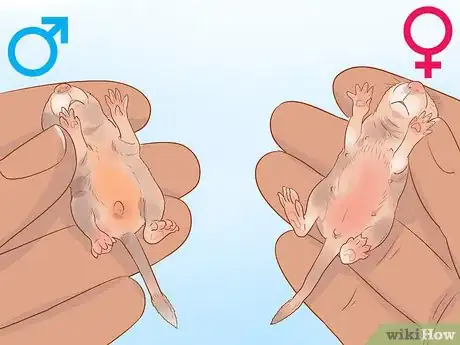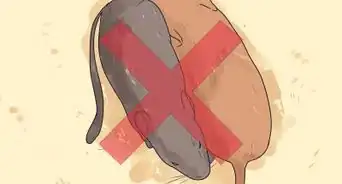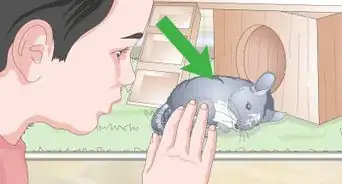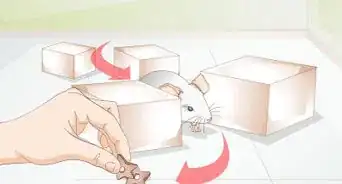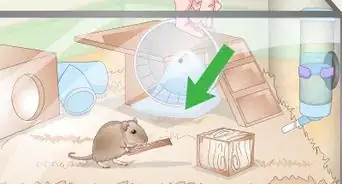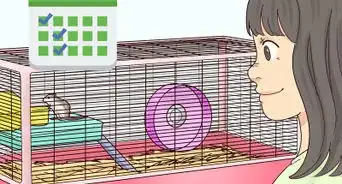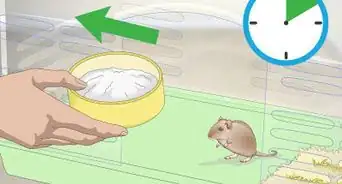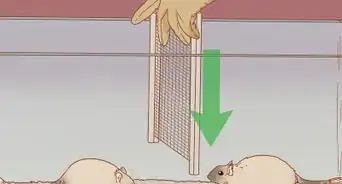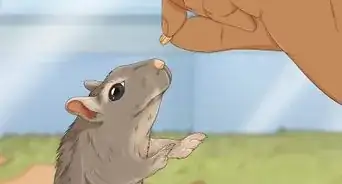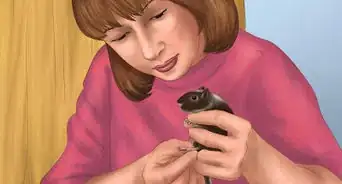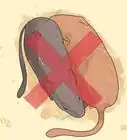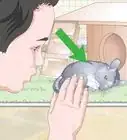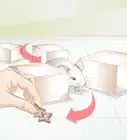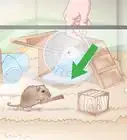This article was co-authored by wikiHow staff writer, Hunter Rising. Hunter Rising is a wikiHow Staff Writer based in Los Angeles. He has more than three years of experience writing for and working with wikiHow. Hunter holds a BFA in Entertainment Design from the University of Wisconsin - Stout and a Minor in English Writing.
wikiHow marks an article as reader-approved once it receives enough positive feedback. In this case, 94% of readers who voted found the article helpful, earning it our reader-approved status.
This article has been viewed 70,812 times.
Learn more...
Gerbils make great pets, and breeding them is a good way to pass down favorable traits. Each litter usually consists of around 6 young, known as pups. If you're thinking about breeding your gerbils, make sure they get along with one another so they can mate. Once the pups are born, it's easy to care them since the parents do most of the work. When your gerbils are grown up, you'll have new pets that you can choose to breed again!
Steps
Introducing and Mating the Gerbils
-
1Choose healthy gerbils over the age of 6 months. Pick a male and female gerbil that are the most docile and easy to handle. Make sure they don’t have any illnesses or deformities since these traits may get passed down to the litter.[1]
- Even though gerbils can start mating at the age of 3 months, it can harm them physically and mentally.
- Females can produce offspring until they’re 2 years old.[2]
-
2Introduce the 2 gerbils in a split cage so they get used to one another. Gerbils that aren’t raised in the same cage may not initially get along if they’re introduced too quickly. Either split the existing cage you have in half or buy a split cage. Put 1 gerbil on each side of the cage. After a day or 2, switch the sides the gerbils are on so they can get used to each other’s scent. Continue swapping the sides 2 times a day for at least a week.[3]
- Split cages can be purchased online or from your local pet store.
Advertisement -
3Put the gerbils together in the same cage once they’re comfortable. Over the time that your gerbils are in the split cage, you may notice them sleeping next to one another with the wall between them or them getting curious. After the first week, try putting your gerbils together to see if they interact well. Watch them closely for 30 minutes to see how they behave.[4]
- It’s normal for your gerbils to play fight and chase each other as they get used to sharing a space. If they actually start biting or you see blood, separate the gerbils again.
- Keep the gerbils apart for 10 days if you need to separate them again.
-
4Allow the gerbils to mate while the female is in heat. Your female gerbil will be interested in mating every 4 to 6 days. As they mate, you may notice them chasing one another followed by the male mounting the female. If your gerbil is healthy, you can expect it to be pregnant.[5]
Tip: Gerbil mating rituals can last up to 2 hours, so leave them alone during this time so they aren’t disturbed.[6]
Taking Care of Your Pregnant Gerbil
-
1Remove toys and equipment from the cage when your gerbil is pregnant. Newborn gerbils can get stuck or lost from their mother if the tank is filled with equipment. Take out everything in the cage except the water, food, and bedding to ensure that your pups will survive.[7]
-
2Feed the mother gerbil a high-fat diet. Your gerbil’s pregnancy can lower its protein and energy levels, so a slight boost in its fat intake can help it stay healthy. Leave 2-3 sunflower seeds or peanut halves in the food dish for the mother. You can also get a high-fat gerbil feed from your local pet store or online.[8]
- Make sure the feed’s fat content is still under 4%, or else the life expectancy of your gerbil could drop if it gets too overweight.
-
3Wait about 24 days for your gerbil to give birth. Your gerbil won’t show signs of pregnancy until the last few days of its 24-day gestation period. Avoid interacting with your gerbil more than once or twice per day since they can get slightly aggressive while pregnant.[9]
-
4Don’t disturb the mother gerbil while it gives birth. The parent gerbils will do all the work, so it’s best to avoid interacting with them once the pups are delivered. Don’t try to reach in and touch the new pups since the mother may bite you or she may reject the babies.[10]
- You may interact with the father gerbil for the first 48 hours after birth. The father will leave the mother alone with its pups during this time so they get used to one another.
Caring for the Litter
-
1Leave the parent gerbils and their pups alone for the first week. After your gerbil has pups, the mother will bring them into a corner to make a nest. The mother and father gerbil will both help raise their young. Avoid interacting with them or changing anything in the cage during the first week after the litter is born.[11]
Warning: Gerbils will start to mate again soon after a litter is born. Take the male out of the cage if you don’t want to have another litter of gerbil pups.
-
2Start handling the pups after 10 days so they get used to your scent. After 10 days, your baby gerbils will have started growing fur, but they still can’t open their eyes. Let the baby gerbils move around in your hand, making sure they don’t fall. They may try to lick or lightly bite so they grow accustomed to you.[12]
- Always wash your hands before and after you touch the babies or else the mother might reject them.
- After 19 days, your gerbils should open their eyes and may need to get used to you by sight.
-
3Feed the pups solid foods after 4-5 weeks. After 4 weeks, your baby gerbils will stop feeding from their mother. Use your regular gerbil feed for the babies, and keep a water bottle low enough so they can drink it when they want.[13]
-
4Separate the male and female pups when they’re 6 weeks old. Check between the gerbil's hind legs for 2 bumps, their urethra and anus. If the bumps are separated by about 1⁄2 in (1.3 cm), then your gerbil is male. If the bumps are close together, the gerbil is female. Keep the female and male gerbils in separate cages so they don’t start mating.[14]
Community Q&A
-
QuestionCan you put an older female in the cage to help out with the mother's pups?
 Community AnswerSometimes, but only if the females knew each other beforehand, and they haven't been separated long. Keep a close eye on them and separate them if they start fighting. ALWAYS remove the male first if you try this, as the females will fight over him and may kill or abandon the pups.
Community AnswerSometimes, but only if the females knew each other beforehand, and they haven't been separated long. Keep a close eye on them and separate them if they start fighting. ALWAYS remove the male first if you try this, as the females will fight over him and may kill or abandon the pups. -
QuestionCan I put an older male from a previous litter in to help?
 Community AnswerNo. This could cause the son to try to breed with its mother and cause inbreeding and heath issues in the pups.
Community AnswerNo. This could cause the son to try to breed with its mother and cause inbreeding and heath issues in the pups. -
QuestionWhy do gerbils fight?
 Community AnswerSometimes they will fight for fun, but sometimes they will fight for territorial reasons. If you notice any blood being drawn, you should separate them immediately. Unless you plan on separating them forever, do not separate them for more than a day--at least until the breeding period is over.
Community AnswerSometimes they will fight for fun, but sometimes they will fight for territorial reasons. If you notice any blood being drawn, you should separate them immediately. Unless you plan on separating them forever, do not separate them for more than a day--at least until the breeding period is over.
Warnings
- Consider adopting or buying gerbils if you don’t want to care for a full litter.⧼thumbs_response⧽
- Make sure your gerbils are healthy before they mate so their pups stay healthy.⧼thumbs_response⧽
Things You’ll Need
- Split cage
References
- ↑ https://youtu.be/ZstPUh-6SLM?t=46
- ↑ https://petgerbils.org/breeding-babies/
- ↑ https://www.pets4homes.co.uk/pet-advice/how-to-safely-introduce-two-gerbils.html
- ↑ https://www.pets4homes.co.uk/pet-advice/how-to-safely-introduce-two-gerbils.html
- ↑ https://www.merckvetmanual.com/all-other-pets/gerbils/breeding-and-reproduction-of-gerbils
- ↑ https://petgerbils.org/breeding-babies/
- ↑ https://www.merckvetmanual.com/all-other-pets/gerbils/breeding-and-reproduction-of-gerbils
- ↑ https://youtu.be/ZstPUh-6SLM?t=106
- ↑ https://petgerbils.org/breeding-babies/
About This Article
If you want to breed gerbils, introduce a male and a female gerbil that are about 6 months old. Place them in a cage that has a divider in the middle, with 1 gerbil on each side of the cage. After a day or 2, switch the sides the gerbils are on so they can get used to each other’s scent. Continue swapping the sides every day or 2 for at least a week. Once the gerbils seem comfortable together, put them in the same side of the cage for about 30 minutes. If they get along well, or even if they play fight, they’re ready to move in together and mate. If they fight seriously, separate them again for about 10 days, then try again. Read on for tips on how to care for your pregnant gerbil!
